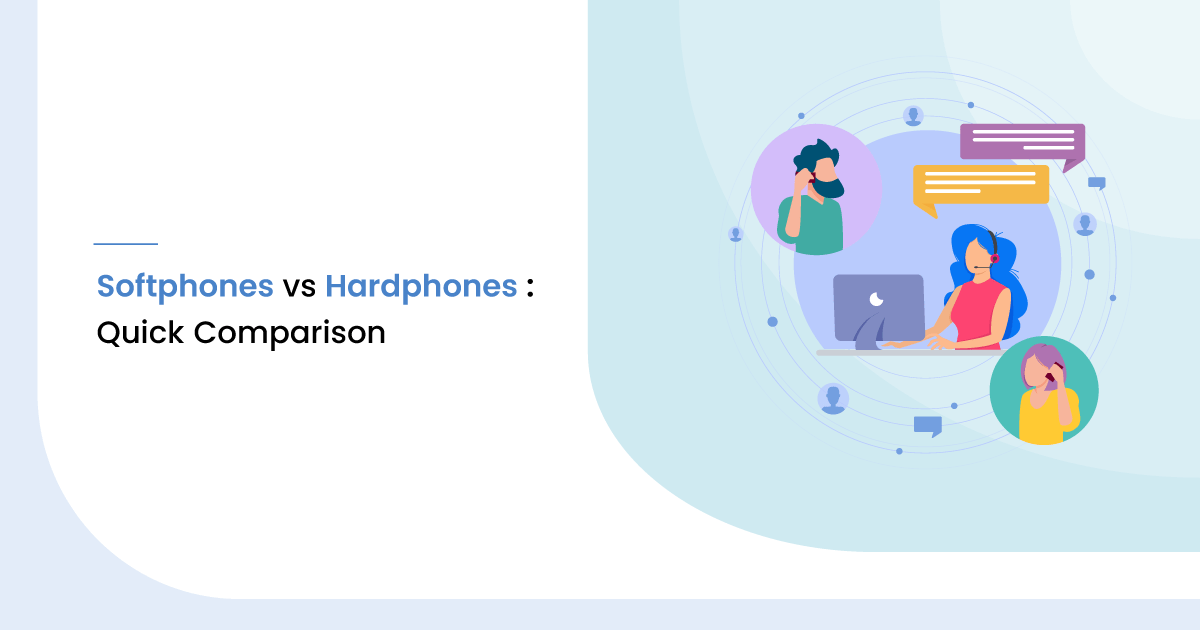VoIP Technology is helping the operators to provide a cheaper channel of communication between users. This is one of the prime reasons why the global VoIP industry is predicted to grow at 9.1% CAGR between 2016-2021. There is even more demand for this technology, given the rise in the remote working environment due to global pandemic COVID-19.
When your business has decided to make a transition to the cloud-based phone system, there are many things that you need to consider. Do you want the traditional desk phones with dial pads, i.e., Hardphones or software-based devices, also called Softphones?
You’ll find some functional differences with softphones vs. hardphones that have been clearly listed in this article to end your confusion.
What is A Softphone?
A softphone is an electronic device that allows the users to make calls using their laptops or desktops. You need to have a computer device that is compatible with the application that helps send and receive voice calls.
Smartphones will let you dial the numbers on your device and speak through the in-built speakers and microphones. The prime benefit is that you can make or take calls using a smartphone irrespective of your location.
One of the most familiar examples of the softphone is Skype that runs even on a laptop and desktop and can be further customized to suit your needs.

Advantages of Softphones:
- The primary advantage of using a softphone is that it will not require any additional device or hardware setup
- Softphones offer more flexibility in case of remote working. Employees can work from anywhere using this software
- They are connected to the internet so you can make and receive calls from anywhere
- Softphones give you easy integration with other applications
What is A Hardphone?
Hardphones, also called desk phones, are traditionally designed and come along with a dial pad and headset. This phone is connected to your business IP network like a traditional phone.
There is no training required to make your staff familiar with such phones, and they can easily use it to call anyone at affordable prices. Several advanced VoIP phones come with built-in-video displays and touchpads to accept video calls.
 Advantages of Hardphone:
Advantages of Hardphone:
- It is easy to use as compare to a softphone
- the employees will not require any onboarding or training to make them familiar with this technology as it is just like a traditional phone
- you can even make calls when the desktop is on a standby mode
Which Type is Ideal For You?
While choosing between softphone and hardphones, there are various things to be considered like –
- Is your organization planning to work remotely?
If so, you can consider using softphones for your business as they provide ease in remote working.
- Do your employees require 24/7 connectivity?
Softphones have an added benefit of providing 24/7 connectivity. They help in routing your calls to one specific internet-enabled device. Also, the voicemail feature enables you to receive messages of calls not picked up, ensuring prompt services.
- Is your company planning to provide excellent customer support services?
Hardphones work without any connectivity issues. This means customers will not face any problems when connecting to your service center.
Hardphones will cost you more, given the hardware required. This cost will be saved in the case of softphones.
- Do you have any in-house technical team?
The in-house technical team will make the onboarding process more manageable and support services seamless. In this case, you can opt for softphones requiring specialized knowledge for using all the software features.
Softphone vs Hardphone: A Side-by-Side Comparison
| Basis of Comparison | Hardphones | Softphones |
|---|---|---|
| What are They? | A physical device like a traditional telephone that uses the company’s IP network instead of phone lines. | Software that turns your laptop or desktop into a VoIP device to make calls. |
| Quality of Calls | Better call quality due to dedicated devices | Quality depends on resources and connection quality |
| User Interface | It generally consists of physical devices with dial pads. There are few advanced devices with touch panel | Software-based interface |
| Customized | Overall features may not be customized, and extra features require high cost | More customization is possible, and the additional functionality can be added with minimal cost |
| Ease of Usage | Does not require any learning curve for someone familiar with traditional phones | Requires learning curve and onboarding may vary as per the features |
| Mobility | Not Mobile | Much mobile and can be used on any desktop, smartphone or laptop |
| Deployment | Relatively difficult to deploy and requires the installation of physical hardware | Very easy to implement, and you just need to install a VoIP software across all the devices |
| Cost | Relatively more expensive as it requires a dedicated set of hardware devices like handset, camera, microphones, etc. | Less costly as there is no separate requirement of hardware devices. The only cost that you need to incur is installation and service charges |
So Which One will You Choose?
Both softphones and hardphones have their own importance in workplaces. The company can make a choice depending on the type of communication channel they want to establish.
To decide from Softphones vs. Hardphones is a critical choice that needs to be done by any organization as both systems have their own set of advantages.
Which one do you think will suit your organizational requirements? Let us know in the comment section about the functionality and advantages of both Softphones vs. Hardphones.
Need Any Technology Assistance? Call Pursho @ 0731-6725516







